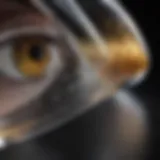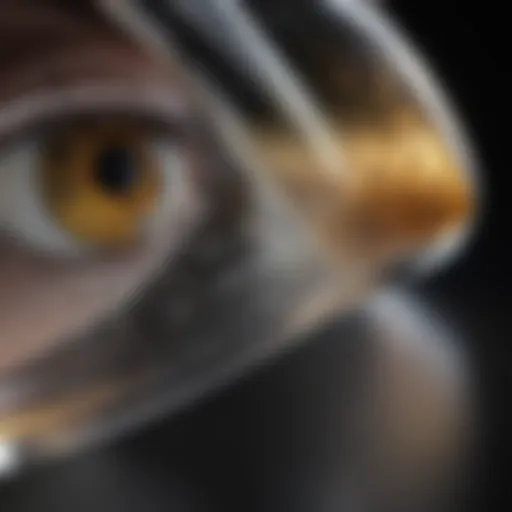Effective Moss Control Solutions for Driveways
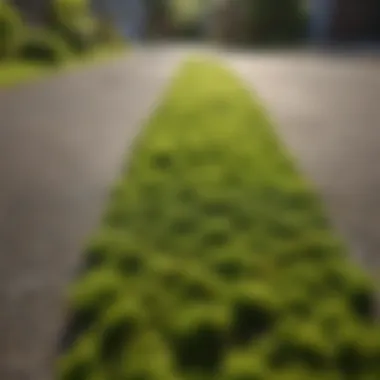

Overview of Topic
Moss on driveways is more than a mere aesthetic issue; it’s a common challenge that many homeowners face, often caused by a mix of moisture and shade. When lounging on a sunny afternoon or entertaining friends, the last thing anyone wants to see is a green patch ruining the view. Moss not only looks unappealing but can also create slippery conditions, posing safety hazards. Therefore, understanding the best methods for removing and preventing moss is crucial for homeowners looking to maintain their property.
The importance of moss control extends beyond physical appearance. A clean driveway enhances curb appeal, increases property value, and contributes to a pleasant living environment. Homeowners should consider not only the immediate effects of moss but also its potential to spread and affect surrounding areas if not addressed promptly.
Common Challenges and Solutions
Homeowners face multiple challenges when dealing with moss on driveways. Some of the most frequently encountered issues include:
- Persistent Growth: Moss can appear to grow back even after treatments.
- Selecting an Effective Product: With numerous options available, knowing which one to choose can be overwhelming.
- Environmental Concerns: Many commercial products carry environmental risks and can harm lawn and garden areas.
To combat these challenges, here are a few actionable solutions:
- Regular Maintenance: Frequent cleaning can prevent moss from taking hold. This includes sweeping away debris to minimize moisture accumulation.
- Choose Wisely: Opt for a moss killer that suits your driveway surface, whether it be concrete, brick, or stone.
- Natural Alternatives: Consider using vinegar or bleach solutions as safe, cost-effective alternatives to chemical products. These options can still be effective while minimizing environmental impact.
"Moss thrives in damp, shady areas. Removing any overhanging branches can significantly improve sunlight exposure and reduce moss growth."
Product Recommendations
When choosing a moss killer, the market offers various products—some chemical, others more eco-friendly. Let’s take an in-depth look at a few top contenders:
Biogreen Moss Killer
- Key Features: Made from plant-based ingredients, non-toxic for pets and kids, and highly effective against a range of moss types.
- Benefits: Safe for the environment and works well in both sunny and shaded areas.
Wet & Forget Moss, Mold, Mildew Stain Remover
- Key Features: A long-lasting formula that doesn’t need rinsing and is rain-fast within hours.
- Benefits: Ideal for large driveways; it works gradually and continues to keep the area free of moss for months following application.
Moss Buster
- Key Features: A concentrated solution that provides coverage for up to 2,000 square feet.
- Benefits: Quick results are seen often within 2-3 days, making it a fast option.
Evaluating each product’s benefits and features is key to selecting the most effective solution that aligns with individual needs and values.
Step-by-Step Guides
To effectively tackle the issue of moss on your driveway, here is a simple step-by-step guide:
- Assess the Area: Check your driveway for patches of moss and determine the size of the area you need to treat.
- Choose Your Product: Based on your assessment, select a moss killer that fits your preferences, be it natural or chemical.
- Prepare the Surface: Clear away any leaves or debris and give the area a light wash with a hose to remove dirt.
- Apply the Moss Killer: Follow the instructions provided in your chosen product for the best results. Ensure even coverage.
- Wait and Observe: Most products will take time to show complete results, usually within a week or two.
- Maintain Regularly: After the initial removal, incorporate a routine to regularly check and treat your driveway for moss.
This systematic approach not only tackles the current moss problem but also helps prevent future outbreaks, ensuring that your driveway remains an attractive and safe space for all.
By understanding the various moss killers available, the challenges presented by their presence, and the proper steps necessary to eradicate them, homeowners can embrace a cleaner, safer driveway. Keeping in mind these guidelines will lead to not just a moss-free drive but long-lasting results.
Understanding Moss Growth
Moss is more than just a mere nuisance that creeps into cracks and crevices of our driveways. Gaining insight into its growth can radically shape how one approaches eradication strategies. Understanding the factors that contribute to moss growth is vital for effective management. For homeowners grappling with unsightly moss patches, grasping the underlying biology and environmental conditions enables informed choices when selecting a moss killer. Moreover, it helps prevent future infestations, ensuring both aesthetics and safety are well maintained.
The Biology of Moss
Moss belongs to a group of non-vascular plants classified scientifically within the Bryophyta division. Unlike flowering plants, they reproduce via spores and lack true roots, stems, or leaves. This quirky structure allows moss to thrive in various environments, from rocky terrains to shaded driveways. The key features include:
- Photosynthesis: Mosses photosynthesize, using light and water to create energy. This accounts for their prevalence in shaded areas where they can absorb moisture more effectively.
- Moisture Retention: Moss can hold significant moisture, thriving in wet conditions. It's almost like they have a built-in sponge handy for rainy days.
- Adaptability: Moss can flourish in different soil types and pH levels, making it highly adaptable. This flexibility can work against homeowners trying to fight it off.
Understanding these biological traits underscores the resilience of moss. When planning to tackle it, it's crucial to bear in mind that simply applying a moss killer without a proper understanding might not bring about the desired results.
Common Conditions for Moss Development
Moss doesn't just pop up randomly; it finds its way to your driveway under certain conducive conditions. Recognizing these can help prevent its pesky appearance in the first place. Here are the common conditions that facilitate moss growth:
- Shade: Areas receiving little sunlight, such as those under overhanging trees or near buildings, serve as ideal hideouts for moss.
- Moisture: Persistent dampness from dew, rain, or poor drainage promotes moss growth. This is particularly true in driveways that don’t slope properly.
- Compacted Soil: Roads or driveways with compacted soil tend to retain moisture, creating a perfect breeding ground for moss.
- Acidic Soil: Moss prefers slightly acidic conditions, thriving in soils that lack adequate nutrients.
- Air Circulation: Poor airflow can lead to higher humidity levels, providing an inviting atmosphere for moss to settle in.
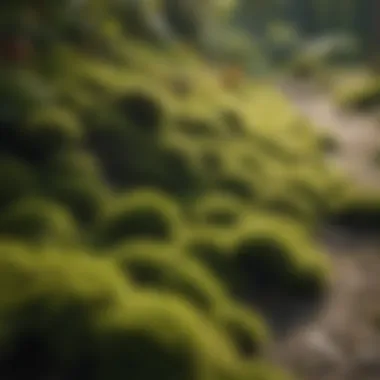

To wrap it up, understanding how moss grows and flourishes plays a crucial role in determining how best to rid your driveway of this unwelcome green intruder. By keeping a keen eye on these factors, homeowners can nip potential moss infestations in the bud and maintain their driveways in tip-top shape.
Consequences of Moss on Driveways
Understanding the impact of moss on driveways is crucial for homeowners. Not only does moss present aesthetic concerns, but it also introduces significant safety risks. Ignoring the presence of moss can lead to long-term damage and even accidents. This section delves into the two primary consequences: aesthetic issues and safety hazards, providing a comprehensive view of what’s at stake.
Aesthetic Issues
Moss can transform an otherwise neat and tidy driveway into a patchy, unsightly mess. Its vibrant green hue may appeal to some, but the accumulation of moss often suggests neglect. For instance, consider a driveway lined with sleek stones. If left unchecked, those stones can become overrun by moss, making the space look unkempt. Over time, this relentless growth can smother the charm of decorative bricks or embellishments, leading to a less visually pleasing environment.
Moreover, a driveway covered in moss can detract from the overall curb appeal of your home. Potential buyers may view heavy moss growth as indicative of larger maintenance issues, influencing their perception of the property’s value. To illustrate, if a house with a pristine lawn and gardens has a driveway overtaken by moss, it sends mixed signals about the level of care. Homeowners striving for an inviting first impression should prioritize routine driveway inspections and proactive moss management.
Moss has a sneaky way of popping up where you least expect it, turning a beautiful path into a green tapestry of trouble.
Safety Hazards
Beyond appearance, moss can create serious safety hazards. When the weather turns wet, moss-covered driveways can become exceedingly slippery. This slick surface poses a risk for falls, particularly for elderly residents or young children who may be less steady on their feet. Imagine stepping out of your car only to find yourself struggling to maintain balance as you navigate your regrettably mossy driveway. Such incidents can lead to painful injuries and potential liability claims.
Furthermore, the moisture retention properties of moss can lead to further driveway damage. Constant moisture can degrade the surface over time, resulting in cracks and other forms of deterioration. These structural issues can escalate the costs associated with repairs down the line. Homeowners are wise to recognize that while it might seem minor, the cost and consequences of moss can snowball, impacting not only the surface but also the integrity of the property.
In summary, moss on driveways is not merely a cosmetic problem; it introduces a spectrum of concerns that merit the attention of every homeowner. By understanding these consequences, one can implement effective strategies for maintenance, ensuring safety and preserving the aesthetic quality of the driveway.
Types of Moss Killers Available
Moss can become a headache when it spreads across driveways, turning them from a welcoming sight to an unsightly mess. Understanding the various types of moss killers available is essential for homeowners looking to restore their driveways to a pristine condition. This section breaks down the different categories of moss killers, emphasizing the strengths and weaknesses that come with each.
Chemical Moss Killers
When it comes to chemical moss killers, they come in many forms, each engineered to break down moss and inhibit its future growth. These products often contain powerful ingredients like potassium salts of fatty acids or herbicides that specifically target moss. They can work quickly, usually providing visibility of results within a matter of hours to days.
Benefits of Chemical Moss Killers:
- Speed: Homeowners looking for quick fixes favor chemicals due to their rapid effectiveness, often seeing results almost overnight.
- Potency: Chemical solutions tend to tackle heavily infested areas that natural alternatives might struggle to penetrate.
However, home users should weigh these benefits against potential environmental impacts; many chemical treatments can affect non-target plants and the surrounding ecosystem. Areas where kids or pets roam may need special consideration, as chemical residues can linger longer than expected.
Natural Alternatives
For those wanting to keep things green and sustainable, natural alternatives to chemical moss killers present an attractive option. These products often utilize ingredients like vinegar or baking soda, or even specialized soaps that break down moss organically. While they may not yield immediate results, they can effectively prevent moss reappearance over time.
Key Points about Natural Alternatives:
- Environmentally Friendly: Made from commonplace household ingredients, they are safe around children and pets, allowing peace of mind during application.
- Long Lasting: While they may work slower than their chemical counterparts, they contribute to a healthier ecosystem, which often fortifies the area against future moss growth.
Organic Solutions
Organic solutions often intersect with natural alternatives but go a step further by adhering to strict organic standards. These typically include products that have been certified to ensure they are safe for all beings and do not leave harmful residues. Examples include vinegar applications diluted with water or mixtures that incorporate essential oils known for their antifungal properties.
Advantages of Organic Solutions:
- Biodiversity-Friendly: Organic solutions can promote a more biodiverse environment by avoiding harsh chemicals that might negatively affect beneficial insects and plants.
- Health-Conscious: Using organic products often reduces the risk of allergies or skin irritations that might arise from handling harsh chemicals.
In summation, selecting the right type of moss killer hinges on recognizing the unique advantages and disadvantages of each option. Whether opting for chemical, natural, or organic moss killers, homeowners can confidently tackle their moss problems, leading to clearer, cleaner driveways.
Evaluating Effectiveness
In dealing with moss growth, evaluating the effectiveness of moss killers becomes crucial for homeowners seeking to restore their driveways to pristine condition. With various products available, understanding their performance helps in making informed decisions. This section delves into two key aspects of effectiveness: the speed of action and the longevity of results. Choosing the right product ensures that not only is the immediate problem addressed, but also that it is managed effectively over time.
Speed of Action
When selecting a moss killer, the speed of action is a top consideration. Homeowners often find that they want quick solutions to visible moss problems. Some products contain higher concentrations of powerful chemicals and act faster, often within hours of application. Conversely, natural and organic solutions can require a longer time to show visible results.
Typically, chemical moss killers are engineered to penetrate quickly into the moss, effectively drying it out or killing it at the cellular level in just a few days. For example, sodium hypochlorite, commonly found in bleach-based cleaners, can act within 24 hours, making it a popular choice for those who prefer an immediate effect.
In contrast, natural killers such as vinegar or baking soda may take several applications over a week or more to see significant reduction. While these methods may be gentler and environmentally friendly, their slower action means they may not meet the urgent needs of every homeowner.


In summary, consider your urgency and the current condition of your driveway. If you need something done fast, a chemical solution might be the best foot forward, while those who can wait may choose something more natural with a longer timeframe.
Longevity of Results
Speed is one thing, but lasting impact is another kettle of fish. No one wants to scramble to kill moss every other week. Hence, the longevity of results should weigh heavily on your decision-making process. Different products have varied staying power depending on their formulations and the environmental conditions.
Chemical moss killers, although effective quickly, often require reapplication at regular intervals. In some cases, the results can last anywhere from a few months to a year, dependent on the application method and local weather conditions. For instance, frequent rain can wash away chemical treatment, necessitating further action.
On the flip side, natural solutions may have a varying degree of effectiveness based on soil conditions and sunlight exposure. While they are less likely to cause harm to your landscaping, their efficacy may also fade faster. Homeowners frequently report that solutions like salt water can keep moss at bay for several months, but their effects may not endure through a particularly damp winter.
"The battle against moss is not just about immediate results. It's about ensuring your way of living remains pleasant and safe all year long."
Thus, in evaluating products, consider both the speed and the ongoing effectiveness of the moss killer. Think about how often you are willing to reapply treatments and what sort of weather patterns you're likely to face. This will guide you in selecting a product that can truly defend your driveway against unwelcome moss and keep your entrance looking its best.
Application Methods
In order to tackle moss effectively, understanding the right application methods cannot be overstated. It’s like having the right tool for the job; you wouldn’t use a butter knife to cut a steak, would you? With moss killers, the technique you opt for can significantly influence the effectiveness of the product as well as the safety of your driveway and surrounding environment.
Choosing the appropriate method hinges on several factors including the size of the affected area, the type of moss killer used, and the specific conditions of your driveway. Below are two primary techniques to consider when applying moss killers: mechanical removal and spray application techniques.
Mechanical Removal
Mechanical removal refers to the physical act of scraping or brushing off moss from the driveway's surface. The benefits of this method are substantial. For one, it guarantees that a large portion of the moss, dirt, and organic debris are physically removed, which can often improve the efficacy of any subsequent treatments. For those who prefer a hands-on approach, this technique can be quite gratifying.
Common tools for mechanical removal include:
- Scrapers
- Brushes (preferably stiff-bristled)
- Pressure washers (when used carefully)
While undertaking this method, it's essential to remember:
- Timing is key: Remove moss before it releases spores; ideally during early spring or late fall.
- Vigilance: Be careful not to damage your driveway surface. Some materials require gentler handling.
- Follow-up: After removing visible moss, apply your chosen moss killer to prevent regrowth.
By incorporating mechanical techniques into your maintenance regime, you establish a solid groundwork for effective moss management.
Spray Application Techniques
Spray application is another common method for applying moss killers, allowing for even distribution of the solution over larger areas. Whether you're using a chemical spray or a more environmentally-friendly option, proper technique in application is crucial.
One major benefit of spray application is its convenience, especially in reaching those nooks and crannies where moss loves to hide. Moreover, spray techniques ensure that the concentration of the moss killer is appropriately applied, avoiding the potential for under-treatment or over-treatment. Here are some guidelines to consider:
- Select the right sprayer: A backpack sprayer or a pump sprayer can work wonders for getting into tight spots. If the area is large, consider using a hose-end sprayer attachment for convenience.
- Weather considerations: Apply on a dry day to ensure maximum absorption. Rain can wash away the chemical, reducing effectiveness.
- Follow instructions: Read the product label for recommended dilution rates and application techniques. Different products have different ideal usage conditions.
"A systematic approach will ensure consistent results, transforming a moss-covered driveway into a clean, safe space for your family."
Safety Precautions
When tackling the issue of moss on driveways, safety should never take a backseat. Whether one opts for chemical treatments or natural alternatives, understanding the importance of safety precautions can make all the difference. Protecting oneself from hazardous materials as well as ensuring that the environment remains intact is crucial for a successful moss elimination process. Ignoring these aspects can lead to personal health risks and potential ecological damage.
Protective Gear Recommendations
Before diving into any moss-killing task, gathering the right protective gear is essential. Here’re some recommended items to consider:
- Gloves: A pair of durable gloves can shield your skin from chemical exposure or even irritation from natural substances. Look for gloves made from nitrile or latex that offer both flexibility and protection.
- Safety Goggles: Shield your eyes from splashes. Even natural solutions can cause stinging if they come into contact with eyes. Investing in a good pair of safety goggles gives peace of mind when spraying or applying products.
- Mask/Respirator: Depending on the product used, airborne particles and fumes could pose a risk. A simple dust mask might suffice for natural treatments, but for chemical killers, a respirator can be a wise choice.
- Old Clothes: It’s advisable to wear clothing that you don't mind getting stained or damaged. Some solutions might react with fabric and cause irreversible changes.
Wearing these protective items is like wearing an armor; it allows you to focus on the task at hand without unnecessary worry.
Environmental Safety Considerations
Beyond personal safety, it's vital to consider the environment while dealing with moss issues. Many homeowners might not realize that the choice of moss killer extends beyond effectiveness and cost—its impact on local flora and fauna is paramount.
- Chemical Runoff: Using chemical-based solutions can lead to runoff, especially during rain. Ensure that the products used do not contaminate nearby water sources, soils, or plants.
- Impact on Beneficial Insects: Some moss treatments can harm bees and other beneficial insects that are critical for local ecosystems. Always check product labels for any warnings regarding non-target organisms.
- Biodegradable Options: Whenever possible, opt for naturally derived products that break down quickly in the environment. This minimization of synthetic chemicals supports not just a clean driveway but a healthy surrounding.
- Dispose Responsibly: After applying moss killers, think about disposal methods as well. Leftover chemicals shouldn’t just be tossed in the trash. Many municipalities have specific guidelines for the disposal of such materials, so always check local regulations and follow them diligently.
Remember: A healthy environment translates to a safe home. Choosing eco-friendly solutions protects not just the driveway, but also the nature that surrounds it.
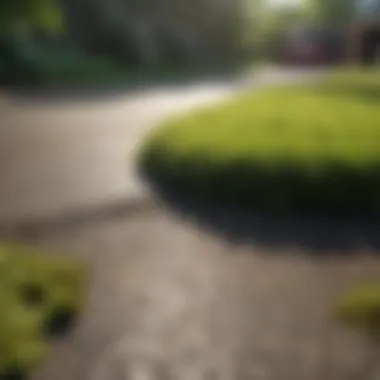

Taking these precautions seriously can help ensure that the task of tackling moss doesn't result in unintended consequences, keeping both home and environment safe.
Cost Analysis
Evaluating the cost of various moss killers offers crucial guidance for homeowners. It's not just about the upfront price tag; it involves analyzing the overall value these products bring in terms of effectiveness, safety, and longevity. A good cost analysis will help readers make informed decisions, allowing them to weigh the immediate expenses against the long-term financial implications of their choices. This ensures that the chosen solution is both economically and environmentally sustainable.
Budgeting for Chemicals vs. Naturals
When it comes to budgeting for moss killers, homeowners often find themselves at a crossroads between chemical and natural options. On one hand, chemical moss killers typically come with a lower initial cost per application. They're often sold in concentrated forms, meaning that a little goes a long way. Brands such as Zep Moss Remover or Wet & Forget can efficiently tackle moss growth, reducing the frequency of applications needed.
However, this short-term financial benefit may go hand in hand with hidden costs. Chemicals could potentially disrupt local ecosystems, necessitating additional protective measures or even resulting in fines for environmental violations.
On the flip side, natural moss killers such as vinegar, salt, or baking soda may appear pricier at first glance due to their organic nature, but they often prove more economical in the long run. Homeowners can easily mix their own solutions, easing the strain on their wallets. These solutions may require more frequent application, especially in areas prone to moss growth, but worry less about safety issues or environmental impact can lead to a peace of mind.
Ultimately, budgeting also requires factoring in the labor costs if hiring someone else to handle the job. A professional service might use effective chemical methods, but this can amp up the total cost depending on service rates.
Long-term Financial Implications
When assessing long-term financial implications, consider how the choice between chemical and natural moss killers plays out. While chemicals may seem more economical at first, their negative effects can add up. For instance, if a chemical solution causes damage to surrounding plant life or leads to soil degradation, the costs associated with restoring that ecosystem can be substantial.
Natural alternatives, despite sometimes being pricier upfront, showcase significant benefits over time. A well-timed investment in natural moss killers may yield healthier driveways and gardens, pending less frequent repairs and treatments. This translates into fewer expenses for landscaping and maintenance, not to mention the emotional comfort of knowing you’re treading lightly on the earth.
"The best investment you can make is in yourself. The more you learn, the more you'll earn." - Warren Buffett
Customer Reviews and Recommendations
Customer reviews and recommendations are invaluable when it comes to selecting the best moss killers for driveways. In a world overflowing with products, hearing from those who have already navigated the waters of moss removal is of utmost importance. These reviews not only highlight real-world effectiveness but can also shed light on nuances that may not be covered in advertisements or technical descriptions. Understanding what actual users loved or disliked about a product can guide potential buyers toward making informed decisions, ultimately leading to effective moss control.
Moreover, reviews often offer insights regarding the application process and the results seen over time. Instead of leaning solely on promotional materials, customers share their experiences, which can often include tips and tricks for maximizing the effectiveness of their chosen product.
Consumer Feedback on Popular Products
When scouring the internet for feedback, you'll find a treasure trove of opinions. Many users rave about the effectiveness of products like Wet & Forget and Moss Out! These brands frequently receive high marks for their ease of application and noticeable results, often after just one use.
- Wet & Forget: Many users appreciate that it requires no scrubbing; simply spray it on and let rain do the work. However, some customers mentioned that they had to wait a week or more to see any change, which can be frustrating for those wanting immediate results.
- Moss Out!: This product is often praised for rapid action, with many observing results within a few days. One drawback, as some users pointed out, is its stronger chemical base, which may not be suitable for sensitive environments, especially if pets are involved.
Myriad reviews point to a shared theme: the satisfaction derived from a clean, moss-free driveway brings their spirits back up. Visual proof, such as before-and-after photos shared on platforms like Reddit, illustrates the success many have enjoyed using these products.
Expert Recommendations
On the other side of the coin, expert recommendations can offer an important layer of assurance. Professional advice typically emphasizes factors like the compatibility of certain products with various surface materials. A recommendation from a lawn care professional, for instance, might lean towards natural solutions for those living in eco-sensitive areas, whereas a contractor might suggest stronger chemical solutions for high-pressure, persistent moss problems.
When seeking out expert opinions, here are a few sources worth checking:
- Local horticultural extensions or gardening clubs often release insights based on regional conditions and challenges.
- Articles from reputable gardening websites or magazines can also provide in-depth product comparisons and recommendations based on industry standards.
Experts often highlight that effectiveness is not just about the product, but how it is applied. For example, following the manufacturer's instructions meticulously can lead to vastly different results than a rushed application.
"The best moss killer is the one that works for your specific conditions. Pay attention to your driveway's material and the environment around it."
Epilogue
In this article, we have traversed the various pathways to effectively combat moss on driveways, a problem many homeowners face. The conclusion is not merely an end; it's the touchstone for everything discussed. It emphasizes the significance of understanding which moss killers to employ, how to apply them safely, and both the short and long-term implications of these decisions.
Summary of Key Insights
One major takeaway from our exploration is the differentiation between chemical and natural approaches. Each has its own pros and cons. For instance, chemical moss killers can often yield results faster than natural ones, yet they may have implications for the environment and surrounding flora. Conversely, natural options offer a greener solution, often requiring more patience which can be a stumbling block for impatient homeowners.
Crucially, the effectiveness of any moss killer also depends on specific conditions present in the driveway. Shadows from trees, moisture from rain, and even the type of surface play significant roles in determining how well a particular product will perform. Therefore, understanding those factors might just save homeowners from additional expenses further down the line.
Final Recommendations
When it comes to choosing the right moss killer, this decision cascades into various aspects of home maintenance and appearance. Here are some crucial pointers for homeowners looking for effective solutions to tackle moss:
- Identify the Surface: Know whether your driveway is concrete, asphalt, or pavers, as different materials may require distinct methods or products.
- Evaluate Environmental Impact: If you're inclined towards eco-friendliness, lean towards organic solutions. They may take time but are less likely to harm nearby plants or wildlife.
- Plan for Maintenance: Consider not just the immediate removal but also ongoing prevention. Regularly cleaning the driveway and providing adequate sunlight can minimize the re-growth of moss.
- Expert Consultation: Don't shy away from seeking professional advice if you're unsure. Sometimes a consultation can shed light on aspects you hadn’t considered.
The choice of moss killer should be an informed one, tailored to individual needs and circumstances, making the driveway not only safe but also visually appealing.
"A clean driveway is a happy driveway."
Ultimately, a well-maintained driveway enhances the overall aesthetic and safety of the home, and understanding the tools at your disposal is crucial for achieving the best results.




